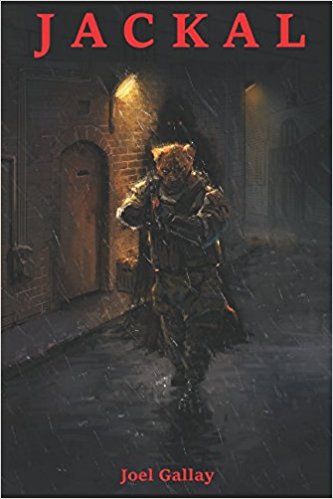Jackal, by Joel Gallay – Book Review by Fred Patten
by Pup Matthias
Submitted by Fred Patten, Furry’s favorite historian and reviewer.
 Jackal, by Joel Gallay
Jackal, by Joel Gallay
San Jose, CA, Gallanic Media, November 2017, trade paperback $12.00 (321 pages), Kindle $4.99.
Don’t be misled by the title. That is not a jackal on the cover but the narrator, Jobe Pungushe (pungushe is “dog” in Zulu), a battle-scarred dog-human hybrid soldier in late 21st-early 22nd-century warfare in southern Africa:
“‘And in local news,’ a newscaster proclaimed, somewhat dimmed by the white noise in my ears, and I went for my tinnitus meds in my wallet pocket. ‘A crime advisory is forecasted in Bulawayo’s northeast burrough given the influx of refugees from former South African states. As we know, officials in New Salisbury announced that they planned to accept the old South African Western Cape province’s offer to join Rhodesia. Offers made by Northern Cape, Free State and Lesotho are still pending. Rhodesian law enforcement predicts that, with the current, nearly anarchic state of the former South African provinces, that by taking in said provinces too quickly may result in adverse effects, from simple crime spikes to the reactivation of extremist cells and assorted loyalist violence, and thus must be undertaken carefully. The final lift on Martial Law in Western Cape is said to go into effect on September fifth. As we know, remnants of the International Kingdoms of Man, the racialist paramilitary group involved heavily during the Independence War, linger in various balkanized South African provinces, and many fear that they still receive support from their overseas comrades in the Greater Argentine Federation to operate as paramilitaries here in Rhodesia and in result, tensions in southern Rhodesia, such as Bulawayo and New Beitbridge, are on edge, especially with the horrors of the Independence War still fresh in many a Rhodesian and South African mind, human or hybrid. Local police urge residents to above all remain civil, and to report all suspicious behaviors to the police and not seek vigilantism or violent organization.’
A scowl met my face as I heard the name of the IKM once more, as my tinnitus subsided. I shuddered a little, despite the heat. My leg ached some more.” (p. 5)
Gallay says Jackal is set “in a world parallel to ours in the close future.” Jobe is a combat veteran, one of many returning to a civilian life in peacetime.
“‘Shit, Jobe.’ The foreman chuckled. ‘You were ready to slot that fucker, ain’tcha? Your fur’s all raised ‘n shit.” The foreman turned to look at me. ‘Kinda funny though. He kinda looked like you, didn’ he? You being a canid hybrid, I mean. Same color’a fur, spots ‘n all’” (p. 7)
But this prologue takes place about ten years before the main story. New Rhodesia has prospered since the war, and is more high-tech than the prologue makes it seem:
“Walking towards the convenience store, I brought up my holowatch, making a few motions with my opposite hand to bring up the display, haptic sensors spotting my movements. I brushed past the menus to my notes, seeing my shopping list. Carton of milk, smokes, dinner for the rest of the week. Frozen dinners were what I defaulted to. Maitabella pudding too, along with some cereal for breakfasts. I quickly paced my way inside, eager to get out of the coming rain. The store was manned by an older-aged draconic hybrid man with wrinkled red skin like dyed leather, wings drooping behind him as he eyed me with tired orange-yellow eyes. Draconics always seemed to draw my eyes, hard to be inconspicuous with those big wings of theirs stuck out like radar dishes.” (p. 8)

